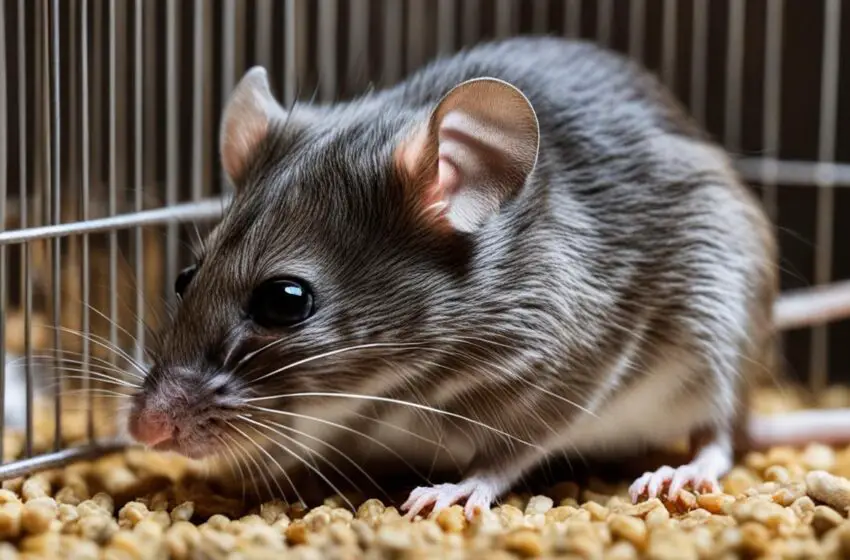Recognizing Signs of Stress in Pet Mice

Pet mice are beloved companions that bring joy and happiness to our lives. As responsible owners, it is crucial for us to understand the well-being of our furry friends, including recognizing signs of stress. Stress can negatively impact the health and happiness of pet mice, so being able to identify and address it is essential.
Key Takeaways:
- Observing changes in behavior, such as reduced activity levels or increased aggression, can indicate stress in pet mice.
- Loss of appetite, weight loss, and excessive grooming are common signs of stress in pet mice.
- The environment in which pet mice are kept, including factors like noise levels and inadequate space, can contribute to their stress levels.
- Pet mice are social animals, and the absence of suitable companionship can lead to stress.
- Health issues can also cause stress in pet mice, making regular veterinary care crucial for their well-being.
By recognizing the signs of stress and taking proactive steps to minimize it, we can ensure that our pet mice live a healthy and stress-free life. Let’s explore each aspect in more detail to understand how to provide the best care for our beloved pets.
Common Signs of Stress in Pet Mice
In order to ensure the well-being of our pet mice, it’s important to be able to recognize the common signs of stress. By identifying these signs early on, we can take the necessary steps to address the underlying issues and improve the overall health and happiness of our furry companions.
Here are some of the common signs that may indicate stress in pet mice:
- Changes in behavior: Stress can cause noticeable changes in a mouse’s behavior. This may include reduced activity levels, where the mouse becomes less active and spends more time hiding or sleeping. Additionally, some mice may become more aggressive or display other unusual behaviors
- Loss of appetite: Stress can affect a mouse’s appetite, leading to a reduced interest in food and weight loss. Owners may notice that their mice are not eating as much as usual or neglecting their meals altogether
- Excessive grooming: Stressed mice may engage in excessive grooming behavior, constantly licking and cleaning themselves. This can lead to hair loss and skin problems if left unchecked
Being mindful of these common signs can help us identify and address stress in our pet mice. It’s important to note that individual mice may exhibit different signs of stress, so being familiar with their normal behavior is key to recognizing any abnormal changes.
“As an owner, it’s crucial to tune into the subtle cues and behaviors of our pet mice. By understanding their stress-related signs, we can provide the needed support and create an environment that promotes their well-being.”
When we notice any of these signs in our pet mice, it’s important to take action to alleviate their stress. This may involve examining their environment, social interactions, or seeking veterinary care if necessary. By addressing these underlying causes, we can help our pet mice lead happier and healthier lives.
Environmental Causes of Stress in Pet Mice
The environment in which a pet mouse is kept can significantly influence their stress levels. Various factors within the mouse enclosures can contribute to stress, including:
- Loud noises
- Bright lights
- Inadequate space
- Improper temperature and humidity levels
These environmental causes can disrupt the mice’s sense of safety and well-being, leading to heightened stress levels. As a responsible owner, it is crucial to provide a calm, comfortable, and stimulating environment for your pet mice to reduce stress.
Creating a Stress-Reducing Environment
Implementing certain measures within the mouse enclosures can help create an optimal environment for your pet mice. Consider the following:
- Minimize loud noises by placing the enclosures in quiet areas of your home.
- Adjust the lighting in the enclosures to provide a more natural and soothing environment.
- Ensure the enclosures are spacious enough to allow for adequate physical activity and exploration.
- Maintain appropriate temperature and humidity levels within the enclosures to promote comfort.
By addressing these environmental causes of stress, you can contribute to the overall well-being and happiness of your pet mice.

**Table: Stress-Reducing Environment Tips**
| Tips for Creating a Stress-Reducing Environment |
| ——————————————————- |
| Minimize loud noises |
| Adjust lighting to a natural and soothing environment |
| Provide ample space for physical activity and exploration |
| Maintain appropriate temperature and humidity levels |
Social Causes of Stress in Pet Mice
While stress in pet mice can be attributed to various factors, one significant aspect that can contribute to their well-being is social interaction and companionship. Pet mice are social animals, and the absence of suitable companionship can lead to stress, loneliness, and anxiety.
Keeping a mouse alone or in poorly matched groups can have a detrimental impact on their mental and emotional health. Without appropriate social interaction, mice may experience heightened stress levels, which can manifest in various ways.
To prevent stress-related issues in pet mice, it is essential for owners to prioritize social companionship. Providing the mice with compatible cage mates can greatly enhance their lives and overall well-being. This includes selecting mice from the same litter or introducing them gradually using proper introduction techniques.
When introducing new mice, it is crucial to monitor their behavior and establish compatibility. In some cases, female mice tend to establish a more harmonious group dynamic compared to male mice, as they are generally less territorial and aggressive. Seeking advice from a knowledgeable pet store or veterinarian can help ensure the best chances of a successful introduction.
By prioritizing social interaction and companionship, owners can create a supportive environment that promotes positive mental health for their pet mice. Companionship can provide the mice with the necessary mental stimulation, reduce loneliness, and foster a sense of security.
Remember, proper socialization and companionship can significantly contribute to minimizing stress in pet mice and improving their overall quality of life.
Quotes:
“Adequate social interaction and companionship are crucial for the well-being of pet mice. Loneliness and a lack of suitable companions can lead to stress and anxiety in these social animals.” – Dr. Jane Johnson, Veterinarian
Mouse Companionship Guidelines
| Guidelines for Mouse Companionship |
|---|
| Observe mouse behavior during introductions |
| Choose compatible cage mates from the same litter |
| Consider introducing female mice, as they tend to establish a more harmonious group dynamic |
| Seek advice from experts, such as vets or experienced pet store staff |
Providing suitable companionship for pet mice is a proactive approach to minimize stress and promote their overall well-being. Remember, happy and socially engaged mice are healthier and more contented pets.
Health-Related Causes of Stress in Pet Mice
When it comes to the well-being of our pet mice, it’s crucial not to overlook the role that health plays in their stress levels. Just like humans, mice can experience pain, illness, and discomfort, which can contribute to increased stress and a decline in overall well-being. By addressing their health-related causes of stress, we can ensure that our furry companions lead happy and healthy lives.
Regular veterinary care is essential in preventing and managing stress-related problems in pet mice. Routine check-ups, vaccinations, and timely treatment of any health issues are crucial steps in maintaining their overall health and reducing stress levels. A knowledgeable and experienced mouse veterinarian can provide the necessary medical attention and guidance to keep your pet mouse healthy and stress-free.
The well-being of pet mice is dependent on their health and medical care. Regular veterinary check-ups and prompt treatment of health issues can help prevent and manage stress-related problems in these small companions.
By addressing health-related causes of stress, we can significantly improve the quality of life for our pet mice. Ensuring proper nutrition and a clean living environment are also essential in promoting their well-being. A well-balanced diet that meets their nutritional needs can strengthen their immune system, reducing their susceptibility to stress and illness.
The Role of Enrichment in Mouse Veterinary Care
Enrichment plays a crucial role in mouse veterinary care and stress management. Providing stimulating activities such as hiding spots, climbing structures, and puzzle feeders can help mice engage their natural instincts and alleviate stress. Additionally, proper environmental enrichment can prevent boredom, frustration, and the development of stress-related behaviors.
It’s important to mention that stress in pet mice can manifest differently depending on the individual. Some mice may show clear signs of distress, while others may exhibit more subtle behaviors. That’s why it’s essential for mouse owners to be observant and familiar with their pet’s normal behavior, enabling early detection of any deviations that might indicate stress or illness.
Health-Related Causes of Stress in Pet Mice
| Cause | Impact on Stress Levels |
|---|---|
| Pain or Discomfort | Can significantly increase stress and diminish overall well-being. |
| Illness or Disease | Can adversely affect the physical and mental health of pet mice, leading to increased stress levels. |
| Lack of Proper Nutrition | Improper diet can weaken the immune system, making mice more susceptible to stress and illness. |
| Unsuitable Living Environment | Inadequate housing conditions can inflict stress, compromising the overall health of pet mice. |

In conclusion, health-related causes can significantly contribute to stress in pet mice. By prioritizing regular veterinary care, providing a balanced diet, and ensuring a stimulating living environment, we can minimize stress and maximize the well-being of our furry friends. Taking a proactive approach to their healthcare needs sets the foundation for a happy and stress-free life for our pet mice.
Strategies to Minimize Stress in Pet Mice
As responsible owners, it is crucial to take proactive steps in minimizing stress in our pet mice. By implementing the following strategies, we can create a peaceful and healthy environment for our furry companions.
Providing a Suitable and Enriching Environment
Creating a comfortable living space is essential to minimize stress in pet mice. Ensure their enclosure is spacious enough to allow for exercise and exploration. Include tunnels, wheels, and hideouts to provide mental stimulation and enrichment. Additionally, maintaining appropriate temperature and humidity levels can contribute to their well-being.
Offering Appropriate Social Interaction
Pet mice are social animals and require companionship to thrive. Ensure they are housed with compatible cage mates to avoid loneliness and anxiety. Regularly monitor their interactions to ensure a harmonious group dynamic. Providing toys and engaging in playtime activities can also help alleviate stress and foster social bonds.
Ensuring a Proper Diet
A balanced and nutritious diet is crucial for the overall health and well-being of pet mice. Consult with a veterinarian to determine the appropriate type and quantity of food for your mice. Implement a feeding routine to prevent sudden changes and provide a steady source of nutrition. Fresh fruits, vegetables, and high-quality commercial pellets should be included in their diet.
Avoiding Sudden Changes in Routines or Surroundings
Pet mice are creatures of habit and thrive in a predictable environment. Avoid sudden changes in their daily routines, such as feeding times or cleaning schedules. Gradually introduce any changes to their surroundings, such as new toys or rearranged furniture, to minimize stress. Maintain a calm and consistent atmosphere to promote a sense of security.
Regular Monitoring of Behavior and Health
Observing your pet mice’s behavior is crucial in stress prevention and management. Keep an eye out for any signs of stress, such as reduced activity, excessive grooming, or changes in eating habits. Regularly check their overall health, including their coat condition, weight, and physical appearance. If any concerns arise, consult with a veterinarian for proper guidance and treatment.
| Strategies to Minimize Stress in Pet Mice |
|---|
| Provide a suitable living environment |
| Offer appropriate social interaction |
| Ensure a proper and balanced diet |
| Avoid sudden changes in routines or surroundings |
| Regularly monitor behavior and health |
Conclusion
Recognizing and addressing signs of stress in pet mice is vital for their overall wellbeing and happiness. As responsible owners, it is our duty to understand the potential causes of stress and take proactive steps to minimize it. By prioritizing proper care, regular observation, and creating a supportive environment, we can ensure that our pet mice live a healthy and stress-free life.
Stress in pet mice can arise from various factors, including environmental conditions, social interactions, and health-related issues. By providing a calm and stimulating enclosure, we can minimize environmental stressors such as bright lights, loud noises, and inadequate living space. Additionally, ensuring appropriate social interaction and companionship for our pet mice can prevent feelings of loneliness and anxiety.
Veterinary care plays a crucial role in managing and preventing stress-related health issues. Regular check-ups and prompt treatment of any underlying health problems are essential for the wellbeing of our furry companions. Furthermore, maintaining a consistent routine and avoiding sudden changes can greatly reduce stress in pet mice.
Overall, by prioritizing the wellbeing of our pet mice through proper care, regular monitoring, and a supportive environment, we can help them lead a happy and stress-free life. Remember, our furry friends depend on us for their care and happiness, so it is our responsibility to ensure that stress is minimized, allowing them to thrive and flourish.
FAQ
What are the common signs of stress in pet mice?
The common signs of stress in pet mice include changes in behavior such as reduced activity levels, increased hiding, and aggression. Other signs may include loss of appetite, weight loss, and excessive grooming.
What can cause stress in pet mice?
Stress in pet mice can be caused by environmental factors such as loud noises, bright lights, and inadequate living space. Lack of suitable companionship and health issues can also contribute to stress in pet mice.
How can I minimize stress in my pet mice?
To minimize stress in your pet mice, provide a calm and stimulating environment, offer appropriate social interaction, ensure a proper diet, and avoid sudden changes in routines or surroundings. Regular monitoring of behavior and health is also important.
Can health issues cause stress in pet mice?
Yes, health issues can contribute to stress in pet mice. Pain, illness, or discomfort can cause significant stress and impact their overall well-being. Regular veterinary care and prompt treatment of any health issues are important to prevent and manage stress-related problems.
Why is recognizing stress in pet mice important?
Recognizing stress in pet mice is important to address any underlying issues and ensure their happiness and health. By identifying the signs of stress, owners can take proactive steps to minimize it and provide a supportive environment for their pet mice.



